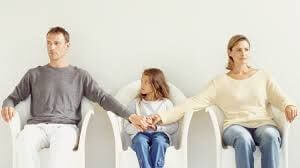
Child Caught Between Divorced Parents
By Rosalind Sedacca, CDC
Whether your divorce is pending or five years behind you, it continues to impact your children. And they will attempt to process that reality according to their age and level of understanding. There are several concepts that cause the most emotional turmoil for children. Being aware of these sensitive areas can help parents address these issues more effectively.
As your children age, they may revisit your divorce with more questions, confusion or insecurity. That’s why it’s essential that you have answers ready based on a keen understanding of how children internalize divorce – even long after it’s over.
There are two major concepts that can create the most emotional pain for children. The first has to do with blame and the second with unrealistic expectations. Here are some suggestions for handling these common challenges.
Children keep blaming themselves for the divorce – even after it’s over!
Regardless of what their parents say, many children still believe they are the reason for their parent’s divorce. This is especially so if the kids have heard their parents fighting about them and related parenting issues. It’s easy for a child to make assumptions about the cause of the divorce. They may think if they had behaved better, fought less with their siblings, received better grades or helped more around the house, they could have prevented the subsequent divorce.
Your divorce may be long past, but some children still need repetition of the same message. It’s important to explain to them that divorce is always between both parents! Regardless of what they may have heard, when their parents fought, children are never the cause of a divorce. Use age-appropriate language when talking to your children. it’s always helpful to explain that there are many reasons why people divorce. Sometimes they may have grown apart. Or the love they once had for each other has changed. Often, they just can’t agree about issues in their lives.
You don’t have to go into specifics in your own circumstances. The important point to make is that both parents love you very much. And one thing is for certain: The divorce was not and is not your fault. You did not cause our divorce and you are not in any way to blame!
Children keep trying to fix your divorce – even after it’s over!
One of the saddest consequences of a divorce is the pressure some children put upon themselves to fix the problem. Getting their parents back together is a huge emotional burden you don’t want your children to undertake. It’s a no-win situation that’s far beyond the capabilities of any child – even when they’re in their teens.
Nevertheless, many children invest time in wishing and trying to make everything okay and get both parents back home again. Part of their strategy may be trying to adjust their behavior so they never get scolded. Or they’re striving for A’s at school and becoming the perfect child.
Some children take the opposite track. They create negative attention to distract Mom and Dad, hoping to side-track the divorce. Some trying acting out, doing poorly in school, jumping onto drugs or other negative behaviors. Their intention is to make the divorce go away by keeping their parents engaged in these other demanding issues.
Again, it’s valuable to address these behaviors head-on. Talk about your children’s feelings. Let them know you understand and acknowledge their right to be angry, frustrated, hurt, confused or ashamed about the divorce. Explain, as well, that they can’t behave their way into avoiding or postponing a divorce. Or restore a marriage following a divorce. It helps when both parents are in accord regarding the finality of the divorce and the messages they are conveying. That makes it easier for your children to accept the tough reality they may have been trying to avoid.
* * *
Rosalind Sedacca, Founder of the Child-Centered Divorce Network, is a Divorce & Parenting Coach and author of How Do I Tell the Kids about the Divorce? A Create-a-Storybook Guide for Preparing Your Children — With Love! The ebook helps parents create a unique personal family storybook that uses fill-in-the-blank templates to guide them through this difficult transition with optimum results. For Rosalind’s free articles, coaching services, programs and free ebook – Post-Divorce Parenting: Success Strategies for Getting It Right! visit https://www.childcentereddivorce.com.
© Rosalind Sedacca All rights reserved.




